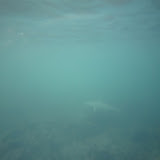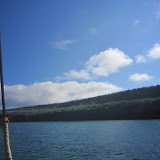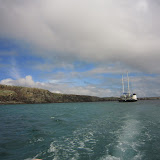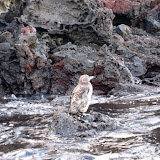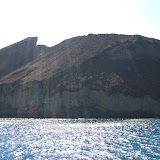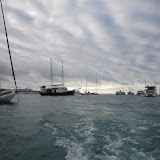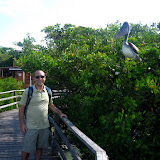The time has come, the walrus said, to talk of many things. So, I'll try to say what I can to sum up the last four months. I'm a bit reminded of a great Onion article about This American Life, and the subject of "things ending" being the final subject they have left to cover. I've talked about basically everything I could think of on this trip. So this seems like the right time for this particular thing to end.
I've been back in New York for five days now, trying to regain my grasp on reality. I've been reunited with my family and my dog Sonny (whom, the other day, I awoke to find asleep on my shoe). I've had several people ask me if it's weird to be home, but in truth it's surprisingly not. In fact, what's weirdest about it is how normal it feels. It doesn't feel like I've been gone as long as I have. When I think about specific things that happened before I left, or how long it's been since I've seen specific people, then I feel the full weight of it. But it doesn't feel like four months since I woke up in this apartment, since I rode the subway, or since I took Sonny out for a walk. It feels like some time has passed, certainly, but more like a few weeks than a few months. It's amazing how easily the routine things stay routine.
The weird result of all this is that my trip also feels, in my mind, like something that existed outside of normal time. In a way, it's true, because, in relative terms, it existed far outside of my normal experience. Travel time always feels a bit different, and when it's all you're doing for four months, things get a bit skewed. But the net impact is that it almost feels like it must have been a dream. Not because the memory of it isn't still vivid, but because it seems so improbable that I should have had the opportunity to do something like this trip. At any rate, I seem to have very quickly moved past the point of not wanting to talk about it at all--I did, after all, document much of it in elaborate detail on the internet--to the point of wanting to talk about it a lot. I'll apologize now to the people this may annoy in the coming weeks. I think it's just a function of my brain trying to come to terms with the fact that I actually did this.
At any rate, this seems like a good time for big picture stuff, so I want to come back to something I haven't really gotten into since I was in Nicaragua, but which was a pervasive issue throughout my trip: poverty. For me, as much as this trip was about the incredible experiences I've had, it was also about what I saw of the world and the lives of others. I'll take with me my memories of the people I met and saw as much as anything else. Obviously not everywhere I went was destitute, although people in Uruguay and Argentina would occasionally explain one dysfunction or another by saying "well, it's a third world country." Having also been to Ecuador--which can't even support its own currency--and Nicaragua, I think there is no doubt that, terminology aside, the Rioplatan region is just on a completely different economic plane than those two. But there is still a significant difference between everywhere I went and the U.S., particularly in terms of access to technology and quality of life. It's also worth noting that the two countries that are the most developed overall--again, Argentina and Uruguay--are the two with the smallest indigenous populations. In both cases, as with the U.S., the original population was almost completely wiped out, and nearly everyone has ancestry from somewhere else. In Uruguay, in fact, the indigenous Charrua culture is completely gone. This may be an indication of greater natural resources more than anything--greater resources would have meant more aggressive colonization, as well as more long-term wealth. But, spending some time down there, the long-term impact of colonization is very apparent.
In that light, it's not particularly surprising that one encounters the mythology of Che Guevara frequently. This is in spite of the fact that the Argentine government has denied any legacy one might grant him--there is not a single street named for him in the country, even though he was arguably the most famous citizen in its history. When traveling through and around South America, it is impossible to escape the fact that a young Guevara himself once traveled a similar route in an effort to get to know himself and to see the world. Anyone who sets out with similar intentions and sees similar places ultimately ends up thinking extensively about Guevara and the things he fought for.
Guevara was, of course, a murderer--even if you do believe many of his actions to have been justified, it's clear that at a certain point he came to delight in violence. Moreover, fighting against a system that perpetuates hegemony by backing a system in which bloodshed is the only source of power is a deeply flawed approach. But the poverty and systematic oppression of indigenous peoples Guevara saw throughout South America saw were a real thing, and still are in many parts of the continent. As in Guevara's time (after all, it's only been fifty years), we have a status quo in which the centuries-old oppression is institutionalized. It's in the U.S. as well, in other forms. The original structures may no longer be in place, but their repercussions are a major factor in many people's daily lives. Of course, the fact that so little progress has been made is just another piece of evidence that Guevara's tactics achieved little aside from changing the body in the dictator's chair. Although given that his ideology seemed as driven by a sense of vengeance as by a sense of justice, this might not be much of a surprise.
Ultimately, regardless of our politics, it becomes a huge problem when we end up trying to decide who deserves what amount of comfort, wealth, and power. It's not a question I can answer, and it's not a question I am interested in answering. But I do think we can largely agree that everyone deserves a few fundamental rights. And walking around Granada or Guayaquil, for example, it's clear that the status quo remains largely unacceptable. As Guevara noted, too many people have no access to opportunities because of who their ancestors were. But too often, those seeking social justice--Guevara included--are preoccupied with the past. As I've noted before, punishing people for the sins of their forefathers is a woefully backward-looking approach to moving forward. It is not possible to reverse the pain of past injustices, but their long-term effects can still be mitigated. The question cannot be "how do we make up for the oppression people have felt?" It can only be "how do we move to a system in which they are no longer feeling the burden of that oppression?" So the focus, in my mind, must be on creating opportunities where currently there are none.
I recognize that I'm writing in terms that are both overly idealistic and extremely simplistic. It's much easier to say "everyone should get a great education and equal access to government" than it is to figure out how to give everyone a great education and equal access to government. The road is far from obvious. There's a scene in The Motorcycle Diaries (the movie, at least) in which Guevara and his friend Alberto Granado visit Machu Picchu, in Peru, and discuss the poverty they've seen along the way. Granado suggests forming an indigenous political party, giving people the opportunity to build a a movement. Che arrogantly scoffs, and argues that change cannot come without bloodshed and bullets. In the end, the kind of change he brought--that won by mass murder--has shown itself no less oppressive and self-serving than the powers it replaced. Granado's solution is no silver bullet, but adding a previously absent voice to the conversation is always a good step. I do believe there must be some way to extend the opportunities which are humanity's birthright to peoples who have for centuries been denied them. I don't know whether it can happen in my lifetime, but I have no doubt that we can make a lot of progress. So, what is the solution in the long run? I certainly don't have an answer. But I know that it's important to keep asking the question. And for me, in many ways, this trip has been about doing just that.
It has been interesting to consider these ideas at a time in which my own country has just completed a massive healthcare debate. It was a debate in which one side argued that providing low-cost or subsidized healthcare to the sick and poor amounted to handouts for the undeserving. I do believe that it's important to have a society in which capitalist opportunities exist--in which people can work hard and achieve and advance, and in which there is always room to grow. And I understand that it is a biproduct of such a system that there will be people whose opportunities, from birth, far outstretch those of fellow citizens. But I also believe that we are all obligated to remember that it is circumstances beyond our control--whether you believe it to be God, luck, or pure random chance--that give us the mere capacity to advance. It was not my choice to be born into a wonderful and supportive family, who could provide for me a great education. Nor was it my choice to be born in a country where I have never had to fear that police might come and take me or my loved ones away for the color of our skin or the thoughts I express. It was not my choice to be born without any major developmental impairments, such that I have the ability to read and to write, to speak and to comprehend, and to get around as I please. It was not even my choice to be born a human being. None of this came from anything I did. That I, this soul, was born into this body in these incredibly fortunate circumstances was nothing short of a blessing. And so to consider myself more deserving of this life than others would be to thumb my nose at the very forces that grant me these opportunities in the first place. So it is that I believe in a fundamental human duty to lend a helping hand whenever the opportunity arises. I don't believe we can--or even should--all be Mother Teresa. If you are sailing along and see a shipwrecked man drowning in the water, diving in to save him won't help if you're not a good swimmer. But sailing blindly on is no better. Not when it would cost you so little, and help him so much, just to toss him a life preserver.
Anyway, I think I'll get off my preachy high horse, and wrap things up. It just seemed appropriate to discuss all this as part of this blog, because it has been the one thing I've thought about every day since I arrived in Nicaragua on January 9th.
It has been an unbelievable thrill to share my journey with you. I am so grateful to live in an age in which this kind of travel and this kind of communication are possible. I hope you've found what I've had to say enjoyable, or at least not completely self-indulgent. Now, at long last, it is time to get back to my dog and my family, and to spending time with old friends as well as new, before starting the next chapter of my life in graduate school. And so, reminded of just how grateful I am for the life I have, I'll continue on to the next adventure, keeping this memory close, always thinking back, and looking ever forward.
Saludos,
Seth



